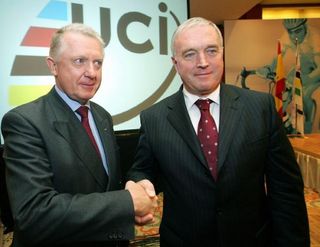Gripper: Cycling is leading the world in the fight against doping
Former head of UCI anti-doping says CIRC report burst final bubble





Anne Gripper – the head of anti-doping at the UCI between 2006 and 2010 – has hailed the Cycling Independent Reform Commission (CIRC) for bursting the final bubble needed in order for cycling to move forward.
Index: Cycling Independent Reform Commission timeline
CIRC recommends retroactive testing, survey of doping
CIRC finds no proof of UCI corruption but questions linger over governance
CIRC uncovers serious weaknesses in UCI anti-doping strategy
Verbruggen claims CIRC report 'confirms his complete innocence'
The Australian, who now works in the world of professional triathlon, gave evidence as part of CIRC during the Commission’s investigation and added that cycling, despite its long ties and history with doping, was leading where all other sports should follow.
“I’ve always said that there were two bubbles that needed to be exposed and then burst before cycling could move on,” Gripper told Cyclingnews.
“One was the Lance bubble and the second was the UCI’s potential cover-up and corruption [charges]. Now with what’s been revealed I just hope that they’re the last of the skeletons from the past so that cycling can move into a different future.”
Gripper, who was praised at several points in the commission’s 228-page report for her efforts in anti-doping, played a pivotal role in the creation and early implementation of the athlete biological passport. She ushered the UCI through the first raft of passport cases before leaving her role in 2010.
While her time at the UCI saw progress the CIRC findings also make for uncomfortable reading for the governing body. Although no proof of direct corruption were found to have taken places, the report is littered with examples of poor and often compromised and inappropriate governance.
One such instance relates to how the UCI, under Pat McQuaid’s leadership, broke their own rules in order to allow Lance Armstrong to compete in the 2009 Tour Down Under. Strict guidelines over an athlete’s testing mean they cannot compete unless they have been in a testing pool for six months. Armstrong should have been ruled out of the Tour Down Under by a 13-day margin.
Get The Leadout Newsletter
The latest race content, interviews, features, reviews and expert buying guides, direct to your inbox!
“That’s the one thing I feel disappointed about because I feel like I succumbed to the pressure of Adelaide and the race organisers who said they’d already announced that Armstrong was going to ride and that I was, as they described, a petty bureaucrat for not allowing Armstrong to ride even though he was only 13 days short of his six month window.
“From a practical point of view it made no difference. We’d already tested Lance pretty thoroughly so the 13 days on a practical level didn’t make a big difference but once again we were bending the rules for a particular person.”

Hein Verbruggen passed the UCI baton to Pat McQuaid in 2005. (AFP Photo)
McQuaid’s governance and stance on anti-doping
McQuaid was the president of the UCI during the implementation of the biological passport and CIRC credit this period as a time of improvement and strides forward in the war on performance enhancing drugs.
“Micro-dosing could be happening but it certainly reduces the performance value, significantly but the culture within cycling has definitely changed.
“USADA and ASADA, they’re becoming more effective because testing is a very blunt instrument. There’s so much that can compromise the ability of a test. It will improve, testing, so the fact that we’ve got the steroidal profiling that I suggested was just around the corner in 2008, is now in place and will be of huge benefit.”
Daniel Benson was the Editor in Chief at Cyclingnews.com between 2008 and 2022. Based in the UK, he joined the Cyclingnews team in 2008 as the site's first UK-based Managing Editor. In that time, he reported on over a dozen editions of the Tour de France, several World Championships, the Tour Down Under, Spring Classics, and the London 2012 Olympic Games. With the help of the excellent editorial team, he ran the coverage on Cyclingnews and has interviewed leading figures in the sport including UCI Presidents and Tour de France winners.
Most Popular



